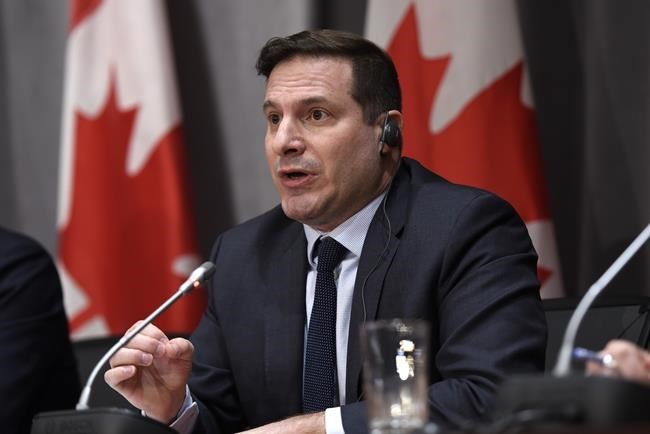OTTAWA — The role immigrant labour is playing to keep the country moving during the COVID-19 pandemic is proof of why robust immigration must continue in the aftermath, federal Immigration Minister Marco Mendicino said Friday.
While the health and safety of Canadians must be assured before the doors of the country can be opened as widely again, they will be, Mendicino said.
He believes Canadians would want it that way.
"Immigration is fundamentally about people coming together to build a stronger country, and that is an enduring value that I believe in, that I have faith in Canadians that they believe in, that we will see endure long after COVID-19 is behind us," he said in an interview with The Canadian Press.
Just as the COVID-19 pandemic was beginning to force travel bans and border shutdowns in March, Mendicino had released the Liberals' next three-year plan for immigration.
It called for the admission of 341,000 permanent residents in 2020, 351,000 in 2021 and 361,000 in 2022, record highs.
They follow annual increases to immigration levels by the previous Conservative government as well, as politicians of all stripes have moved to address chronic job shortages in certain sectors of the economy.
But with domestic unemployment nearing historic levels, questions are already emerging about whether those increases are sustainable.
"Given that the economic crisis will linger long after the health crisis has passed, can Canada accommodate an additional one per cent of immigrants and refugees added to our population in the foreseeable future?" Conservative immigration critic Peter Kent asked Mendicino during a recent appearance at a House of Commons committee.
Mendicino told the committee an update on the levels would be provided in the fall. On Friday, he wouldn't say whether the targets remain feasible, even from a logistical point of view, given the border and travel restrictions in place around the world.
But he said the pandemic has showcased the essential nature of the work newcomers do.
"We could not put food on the plate of Canadians at an affordable price without immigrants, we could not support our front-line workers without immigration," he said.
"So it's vitally important that we continue to immigrate today in a manner that is safe and orderly and also to drive that future that we all believe will be underpinned by immigration as it has been in the past."
Temporary foreign workers who are largely employed by the agriculture industry were initially shut out from Canada when a decision was made to close the border to all but citizens or permanent residents.
The government moved swiftly to reverse that decision after an outcry.
The fact that people considered so essential, however, often work in less-than-optimal conditions and with grave uncertainty around their futures has also raised questions about whether the program itself needs to be rethought.
Mendicino said the government has moved to create better roads to permanent residency for temporary foreign workers.
A new program that opened Friday is aimed at those working in meat processing, mushroom and greenhouse production, as well as livestock-raising industries. It would give them the ability to settle in Canada permanently.
The program had been announced a year ago and was expected to open for applications earlier this year, but that was delayed due to the pandemic.
The planned resumption of the parent and grandparent sponsorship program in late April is also on hold, and there's also a question about the future of the international student program.
With international students pouring an estimated $21.6 billion into the economy, their absence this fall as borders remain closed could be a huge blow.
The government is trying to alleviate that by making some tweaks to keep students connected to Canada. One change announced this week has been to allow those who will now be taking courses online to still qualify for the student working visas that previously required a certain amount of time in Canada.
Another program on pause is refugee resettlement.
The Liberals were heavily criticized for shutting down that stream of new arrivals when they shut the borders in March. Advocates continue to argue that the world's most vulnerable need the assistance now more than ever.
Prime Minister Justin Trudeau said Friday that the health and safety of Canadians must come first, but Canada remains committed to upholding its refugee resettlement obligations under international conventions.
"We will always make sure we're getting that balance right," he said.
"But first and foremost, my job is to look out for the well-being of Canadians."
This report by The Canadian Press was first published May 15, 2020.
Stephanie Levitz, The Canadian Press



